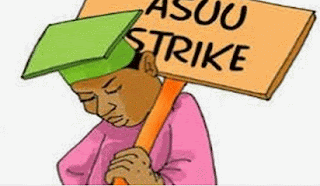Asuu update after successful election
THE Academic Union of Universities, ASUU, on Thursday, February 7, 2019, called off the strike it embarked upon on November 4, 2018 shortly after resumption from the long holidays.
Its President, Professor Biodun Ogunyemi, said it was suspended after reaching a “Memorandum of Action, MOA, with the Federal Government. ASUU obviously had to press for an MOA instead of the usual Memorandum of Understanding, MOU, which the Federal Government always failed to honour. The Union’s main reasons for the “annual” strikes boil down to low wages and the continued degeneration of the tertiary institutions due to poor funding by governments.
We hope that the MOA will be implemented to prevent further strikes. More importantly, we hope that the new leaders being elected during the ongoing general elections will look at education in a new, positive light by increasing funding to the sector. For instance, in the 2017 Federal Budget, only N605.8 billion (or 7.04 per cent) was budgeted for education, which was a far cry from the 15 to 20 per cent recommended minimum by the United Nations Educational, Social and Cultural Organisation, UNESCO.
The Minister of Education, Mr. Adamu Adamu, has acknowledged that Nigeria’s attitude to education funding is a nonstarter: “None of the E9 (Bangladesh, Brazil, China, Egypt, India, Indonesia, Mexico, Nigeria and Pakistan) or D8 countries (Bangladesh, Egypt, Nigeria, Indonesia, Iran, Malaysia, Pakistan, and Turkey) other than Nigeria, allocates less than 20 per cent of its annual budget to education. Indeed even among sub-Saharan Africa countries, we are trailing far behind smaller and less endowed nations in terms of our investment in education”.
Increased funding of education at all levels will apart from minimising strikes in the sector also help alleviate the poor quality of graduates we turn out. The National Employers Consultative Association, NECA, Director-General, Mr. Timothy Olawale, has pointed out that frequent ASUU strikes help to render our graduates unemployable.
Besides, when youths are forced to languish at home for prolonged periods and spend more years at school than prescribed by their course schedules they tend to lose faith in the system in addition to losing many useful years of their active lives. There is no way the Nigerian university system can inspire confidence or enjoy reasonable rating internationally unless stability is restored.
All stakeholders must also be mindful of the danger of knowledge dichotomy it imposes on the children of the common man (including those of university lecturers) since most of our politicians send their children abroad due to their corrupt access to the public treasury.
It requires a stronger, more focused action to force policy makers to increase education funding. Abandoning the struggle to ASUU alone will only leave them with fewer options other than the resort to strikes.
